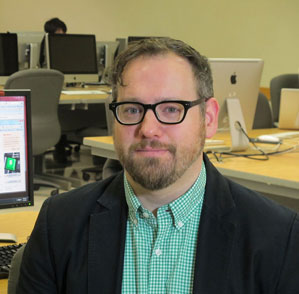IU is a charter member of new Higher Education Video Game Alliance
Organization to demonstrate, promote how video game programs help prepare 21st-century workforce
Faculty from Indiana University are part of the new Higher Education Video Game Alliance announced last week at the Aspen Ideas Festival. The alliance is intended to showcase how video game programs help educate and prepare students for the 21-century workforce.
IU is one of 19 charter members of the alliance, which is open to university faculty, directors of game design programs, department heads and other campus leadership. Other charter members include MIT, New York University and Stanford University. The alliance goals include allowing members to share and highlight best practices, publish research, initiate and strengthen industry connections, and educate and engage policymakers and the media.
Sean Duncan, assistant professor in the Learning Sciences Program at the IU School of Education and a research scientist with the Center for Research on Learning and Technology at IU, is a faculty representative to the alliance and is heading up the formation of a larger Indiana faculty team.
“In the past, there have been productive venues for games educators to discuss best practices,” Duncan said. “However, the HEVGA provides much more than just a venue to share experiences. It provides a unified voice for advocacy, a place to share knowledge across higher educational institutions, and a way to open the door to increased collaboration between higher education institutions. It puts IU even more firmly on the map as a university connected to other cutting-edge game programs in higher education, bringing us into conversation with pre-eminent games and learning research institutions and top games education programs in the nation.”
Duncan said he and the IU faculty team will be involved in alliance events that will strengthen industry partnerships for IU and bring IU researcher perspectives on best practices to games education.
“I will strive to develop relationships between IU and federal legislative and executive branches on funding and policy priorities regarding games,” he said. "This opens doors for us as an institution to federal initiatives related to games education and learning more broadly, as well as creating stronger connections between IU faculty and students and the other HEVGA charter institutions.”
Interactive games for education, particularly relating to science, technology, engineering and math fields, are a priority for White House education initiatives.
"Game development programs are growing the next generation of America's STEM leaders: providing excellent career training, serving as incubators for game design and technology innovation, and advancing state-of-the-art game research,” Mark DeLoura, senior advisor for digital media at the White House Office of Science and Technology Policy, said in a news release from the alliance. “Efforts to increase the connections between educators and professional game developers will help to further strengthen American competitiveness by enhancing the collective power of these programs.”
From his perspective, Duncan said initiatives like the alliance serve as a reminder that games aren’t simply entertainment or a means of interactive technology.
“Games pervade our lives in ways they never have before in human history,” he said. “Higher education needs to develop a better understanding of games’ cultural impact, the science of how we play and the economic implications of these media.”
Duncan added that universities have barely uncovered such understanding. “With the connections that the HEVGA affords, we hope to continue to grow game design, game studies, games and learning, and other associated programs across the higher education landscape,” he said. “Certainly, this alone could be to the benefit of IU, but it's more than that: We need a better national conversation about these complex media, one that does not simplify them nor reduces them simplistically. And what better place to push forward that particular conversation than our institutions of higher learning?”
More about Duncan’s work can be found on the Web page for his research group within the Center for Research on Learning and Technology, the Playful Culture Lab.
 Sean Duncan, assistant professor in learning sciences at the IU School of Education
Sean Duncan, assistant professor in learning sciences at the IU School of Education